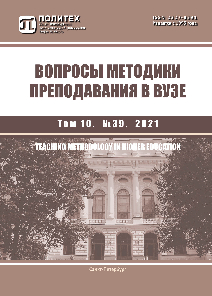Metodology of professional pedagogy: technology of students’ thinking development
The relevance of the study is due to the demand for professional pedagogy in connection with the increasing demands of society on the competence of graduates. It is shown that one of the factors of professional competence is the developed professional and activity-based thinking of university graduates, which meets employer needs. The goal of the article is to analyze existing ideas on students’ thinking process in the field of humanities for extrapolation on technical education and to describe the technology of students’ thinking development within the framework of the methodology of professional pedagogy, taking into account the recommendations of the Federal State Standard (FSS). The authors of the article rely on the scientifically substantiated psychological and pedagogical concept of technology for developing students' thinking, which organically combines value-semantic orientations and mental operationalism. The technology worked out by the authors for the development of students' thinking is based on professional-activity thinking as a set of interconnected intellectual procedures/actions, based on value-semantic orientations carried out through the basic operations of intellectual activity. Examples of the technology use in various areas of specialist training are given. Taking into account the thinking operations (analysis, comparison, synthesis, abstraction, generalization), the operationalization of professional activity thinking has been proposed in the technology of developing leadership-communicative and riskological competences, as well as the competence of rational environmental management of students of military and polytechnic universities.



